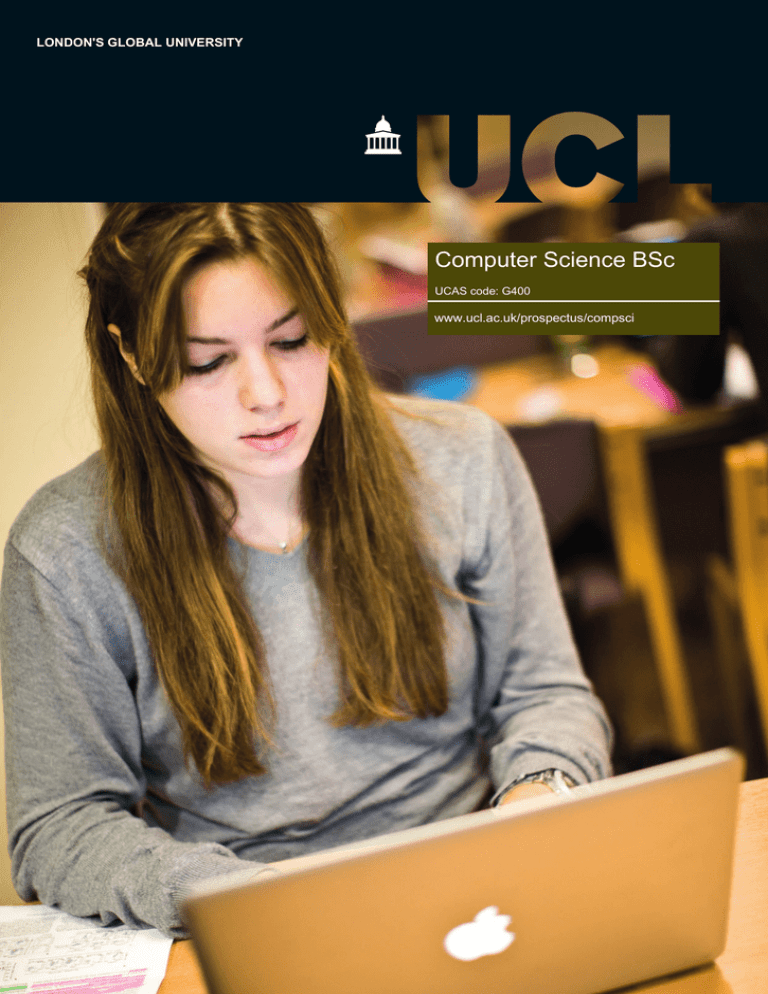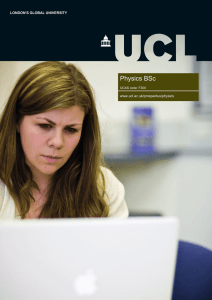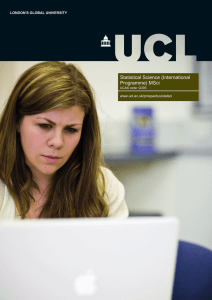Computer Science BSc LONDON'S GLOBAL UNIVERSITY www.ucl.ac.uk/prospectus/compsci UCAS code: G400
advertisement

LONDON'S GLOBAL UNIVERSITY Computer Science BSc UCAS code: G400 www.ucl.ac.uk/prospectus/compsci Computer Science BSc With its strong focus on solving real-world problems through problem-based learning, this BSc delivers world-class, industry-relevant teaching. The programme provides the essential material employers expect from a top-quality computer science graduate, and will prepare you for employment in a wide variety of industries. Degree summary • World-class researchers have designed and teach our courses to ensure that our material is cutting-edge. • Located in purpose-built accommodation, the department offers excellent laboratory and experiment facilities in a friendly and personal learning environment. • • Our location in the centre of London strengthens our close associations with industry and the financial sector, and offers you extensive opportunities for developing contacts with potential employers. The degree is part of an integrated programme across engineering providing opportunities to broaden your horizons through interactions with other disciplines. The Computer Science MEng and BSc programmes share a common core for the first two years. The aim of this core is to cover the essential material required by all computer scientists, whatever their particular interest or specialisation. The core covers all the main strands of computer science: architecture, programming, theory, design and mathematics. In your final year you will carry out an individual supervised project, and follow core courses in operating systems, computational complexity, and technology management and professional issues. In addition you take courses selected from within the department. This degree is part of the Integrated Engineering Programme (IEP), a teaching framework that engages students in specialist and interdisciplinary activities designed to create well-rounded graduates with a strong grasp of the fundamentals of their discipline and a broad understanding of the complexity and context of computer science problems. Students engage in activities that span departments so the development of fundamental technical knowledge takes place alongside specialist and interdisciplinary research-based projects and professional skills. This creates degrees encouraging professional development, with an emphasis on design and challenging students to apply knowledge to complex problems. Your learning Courses usually last for one term and include a mixture of lectures, tutorials and lab classes. There is a focus on practical problem-based learning and group work. From the very first week you will be applying theory and working with others to solve real and challenging problems. Individual support is offered to all students through a personal tutorial system. All courses are assessed, usually by individual or group coursework assignments and an unseen written examination at the end of the academic year. Student performance is continually monitored, and students wishing to progress on to the MEng programmes must have demonstrated excellent academic performance by the end of the second year. Your career Strong practical and analytical skills developed during your studies will leave you well-placed to meet the growing global demand for graduates in this fast-moving industry. Our graduates have previously secured careers with global IT consultancies, as IT analysts with City of London banks and as IT specialists with manufacturing industries. However, your UCL Computer Science degree will provide you with an excellent foundation for almost any career. Alternatively, you may also choose to pursue further academic study such as a Master's degree or doctoral research. First career destinations of recent graduates (2011-2013) of this programme include: • • • • • Software Developer, Credit Suisse Business and Systems Integration Analyst, Accenture Application Designer, Deutsche Bank IT Analyst, Microsoft Multimedia Programmer, Google Degree structure In each year of your degree you will take a number of individual courses, normally valued at 0.5 or 1.0 credits, adding up to a total of 4.0 credits for the year. Courses are assessed in the academic year in which they are taken. The balance of compulsory and optional courses varies from programme to programme and year to year. A 1.0 credit is considered equivalent to 15 credits in the European Credit Transfer System (ECTS). Year One Compulsory subjects Discrete Mathematics for Computer Scientists Integrated Engineering Principles of Programming Object-Oriented Programming Professional Engineering and Design Robotics Programming Theory I Theory II Optional courses All first-year courses are compulsory Year Two Compulsory subjects Compilers Design and Professional Practice Engineering Minor Logic and Database Theory Mathematics and Statistics Object-Oriented Design Software Engineering and HCI Optional courses All second-year courses are compulsory Final Year Compulsory courses Computational Complexity Minor Module I Minor Module II Operating Systems Individual Project Optional courses You will select credits from a wide range of optional courses. Options may include the following: Artificial Intelligence and Neural Computing Computational Photography and Capture Computer Graphics Database and Information Management Systems Functional Programming Image Processing Interaction Design Networked Systems Entry requirements A levels department to find out more about us and what it’s like to study at UCL Computer Science. Fees A level grades A*AA UK/EU fee £9,000 (2016/17) A level subjects Mathematics required. Overseas fee £22,380 (2016/17) AS levels For UK-based students a pass in a further subject at AS level or equivalent is required. Notes Details about financial support are available at: www.ucl.ac.uk/study/ug-finance GCSE English Language and Mathematics at grade C. For UK-based students, a grade C or equivalent in a foreign language (other than Ancient Greek, Biblical Hebrew or Latin) is required. UCL provides opportunities to meet the foreign language requirement following enrolment, further details at: www.ucl.ac.uk/ug-reqs The Google Europe Anita Borg Memorial Scholarship Google offers a number of scholarships to women students in Computer Science. Contacts Contact IB diploma IB points 39 Subjects A total of 19 points in three higher level subjects including Mathematics, with no score below 5. Other qualifications Full lists of all degree programmes and other entry requirements can be found on our website at: www.ucl.ac.uk/otherquals Undergraduate Preparatory Certificates UCL's Undergraduate Preparatory Certificates (UPCs) are intensive one-year foundation courses for international students of high academic potential, who are aiming to gain access to undergraduate degree programmes at UCL and other top UK universities. For more information see our website: www.ucl.ac.uk/upc Your application Application for admission should be made through UCAS (the Universities and Colleges Admissions Service). Applicants currently at school or college will be provided with advice on the process; however, applicants who have left school or who are based outside the United Kingdom may obtain information directly from UCAS. In addition to academic requirements, we are looking for you to demonstrate a proven interest in computing and a clear understanding of what studying computer science entails. We are keen to admit students with an interest in subjects that relate to applications of computer technology. If your application demonstrates the academic profile and commitment to computer science we are looking for, you will be invited to visit the PDF Updated: February 19, 2016 Information correct at time of going to press. See website (www.ucl.ac.uk/prospectus/compsci) for latest information Dr Danail Stoyanov Admissions Tutor Email undergrad-admissions@cs.ucl.ac.uk Telephone +44 (0)20 7679 3690 Prospectus entry www.ucl.ac.uk/prospectus/compsci Key facts REF 96% rated 4* (‘world-leading’) or 3* (‘internationally excellent’) Department Computer Science Faculty Engineering Sciences











